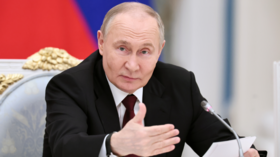The Media Mirror, 18.07.07. What's in today's Russian newspapers?
The Russian press reports on the inauguration of the new Syrian president, speculating in this respect about the overall situation in the Middle East. One of the papers publishes an article about the state and real essence of modern democracy in Russia an
Rossiyskaya Gazeta focuses on the new U.S. initiative for the Middle East – an international conference on the regional problems which, in fact, is a Russian initiative from two years back repeated by Foreign Minister Sergey Lavrov at least half a dozen times since.
Vremia Novostei reports on the inauguration of the Syrian President Bashar Asad, who is starting his second seven-year term. The paper says Mr Asad highly appreciates the idea of a conference on the hot issues of the Middle East. He says the U.S. admits the role of Damascus in regional affairs but too often tries to make Syria act against its national interests.
The Middle East conference may become an example of U.S. – Russia co-operation but a new mode has to emerge in the relations of the two great powers first. Rossiyskaya Gazeta’s Tuesday edition has an article by Mikhail Margelov, Chairman of the International Relations Commission of the Federation Council, the Russian Senate. He says pragmatism as the main approach to international affairs is a common path that the two nations can walk together, not necessarily holding hands or embracing on the way.
Izvestia publishes an article by historian Dr Vasily Dmitriev, entitled “A Bastillian Democracy”. The writer starts by disillusioning the readers over the storming of the Bastille in 1789. There was nothing democratic about it, he says. “The only seven prisoners – four money forgers, one sexual maniac and one madman were carried around Paris in triumph and a score of army veteran invalid guards were brutally killed.” Of Russia, using Greek historian Polybius’s cyclic principle of government change, Dmitriev says, “Here we have a de facto enlightened monarchy rather than democracy, as the majority of the population revere and love the incumbent president. And do not trust the Duma. A good tsar and bad boyars is a situation that is not actually new for Russia,” he warns.
Speaking about today’s democracy in the U.S. and Western Europe, Dmitriev says “it is down to the choice of sausage brand in a supermarket”. Everything else is decided by corporations and fed cooked to the population through the media. By the same Polybius’s principle, Western democracy today is nothing but ochlocracy, power of the crowd led by the nose by oligarchs. So, where is democracy, asks the author? The Bastille, you say, is a symbol of what?











